With Donald Trump winning a come-back victory as president of the United States and results pointing to Republican control of both chambers of Congress, analysts and commentators around the world are offering their views on what this means for the world’s battle to tackle climate change.
At home, Trump – a climate-change sceptic – has promised to encourage the production of fossil fuels and rein in Biden’s green economy spending.
Internationally, he has said he would withdraw the US from the Paris climate agreement, as he did briefly during his first term in office. He is reportedly also considering trying to quit the 1992 United Nations Framework Convention on Climate Change (UNFCCC), the treaty that establishes the basic architecture for countries to work together to address climate change. And he may cut the US’s climate finance contributions to developing countries.
Climate Home has compiled reactions from climate experts in the US and beyond on the implications of a Trump victory for global climate policy and climate action in the United States:
Todd Stern, former US climate envoy
Speaking before the election, Todd Stern – who was former President Barack Obama’s chief climate negotiator, including on the Paris Agreement – said that if Trump blocks efforts to cut his country’s CO2 emissions, it “will be very disappointing – to put it mildly”. But, he added, “the machine is moving – the wheels that are spinning in all elements of clean technology are not going to stop”.
He said Trump would try to pull back Biden’s green spending through legislative mechanisms like the Inflation Reduction Act. But “in many cases, they won’t be able to do that”, Stern added, because a lot of the spending has been in states with Republican Congressmen and Governors who are “not going to want those things to be undermined because of jobs and employment”.
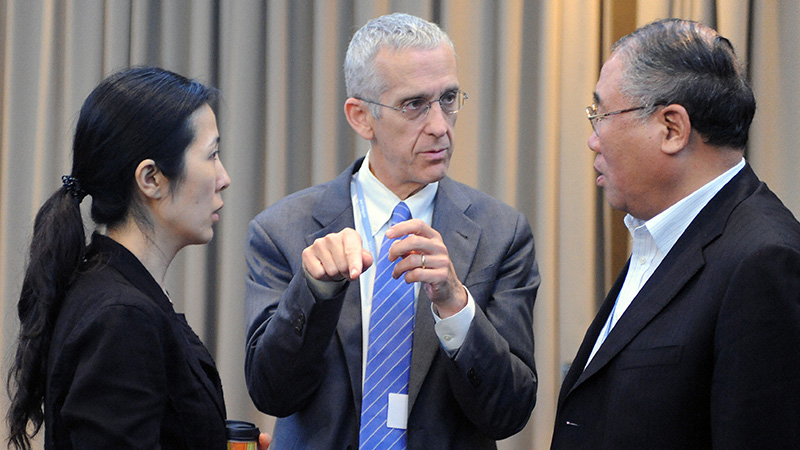
US climate envoy Todd Stern consults with his Chinese counterpart Xie Zhenhua in 2011 (Pic: IISD Reporting Services/2011)
Gina McCarthy, former US presidential climate adviser and Environmental Protection Agency administrator
Echoing Stern, McCarthy said “the shift to clean energy is unstoppable and our country is not turning back”. She added that the EPA and all public servants “stand ready to do their jobs, follow the science, and protect the rule of law”. “We all must stand ready to hold this administration accountable to do its job of protecting our people and our environment,” she added.
“Bloomberg’s America Is All In [a coalition of local leaders supporting climate action] will work with cities, states and the private sector to do everything in its power to stop this administration from unwinding the progress we’ve made on climate,” she said.
Simon Stiell, head of the UNFCCC
Speaking in the Azerbaijani city of Baku today, which will host COP29 next week, the Grenadian diplomat said that “the fundamental facts remain unchanged”.
He said “global heating is already hammering every nation” and “those investing in clean energy are already enjoying huge wins in terms of jobs and wealth, and cheaper, more secure energy.”
He warned: “Unless all countries can cut emissions and build more resilience into global supply chains, no economy – including the G20 – will survive unchecked global heating, and no household will be spared its severe inflationary impacts.”
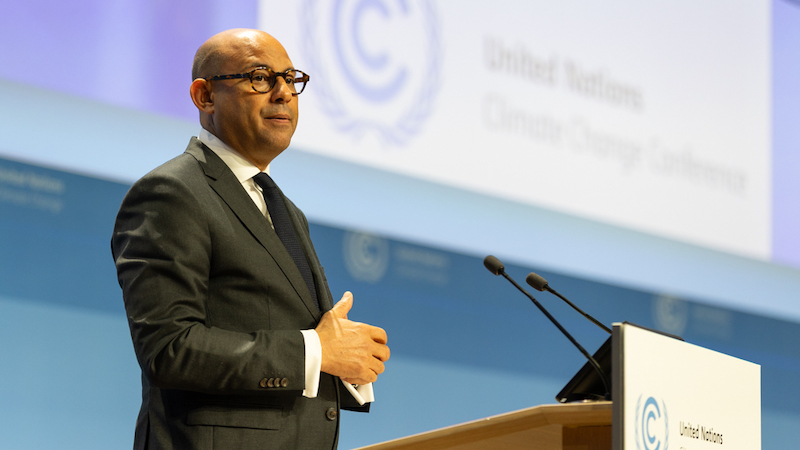
UNFCCC Executive Secretary Simon Stiell speaking at the closing plenary of COP28. Photo: IISD/ENB – Kiara Worth
Jennifer Morgan, German government climate envoy
The US-born diplomat said that the German government would “work with the next US administration wherever possible to strengthen the international rules-based order and deal with shared security challenges, including the climate crisis.”
“For Germany and the EU the transition to climate neutrality is a cornerstone of our future competitiveness. We therefore will work with all partners towards a level playing field in the race for green industries,” she added.
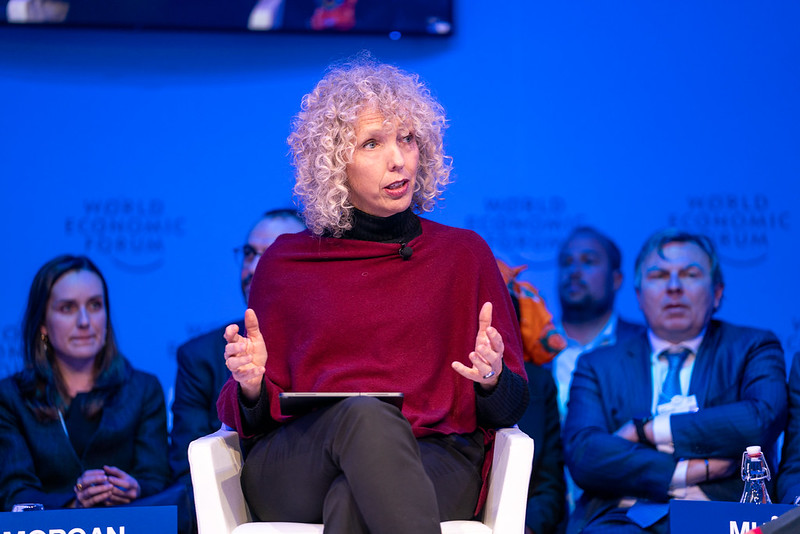
Jennifer Morgan speaks at the World Economic Forum in 2020 (World Economic Forum/Boris Baldinger)
Christiana Figueres, former head of the UNFCCC
The Costa Rican diplomat, who oversaw the Paris Agreement in 2015, said the US election result was a “major blow to global climate action, but it cannot and will not halt the changes underway to decarbonise the economy and meet the goals of the Paris Agreement”.
She added: “Standing with oil and gas is the same as falling behind in a fast-moving world. Clean energy technologies will continue to out-compete fossil fuels, not just because they are healthier, faster, cleaner and more abundant, but because they undercut fossil fuels where they are at their weakest: their unsolvable volatility and inefficiency.”
Legal experts say Trump could quit Paris pact – but leaving UNFCCC much harder
Izabella Teixeira, former Brazilian environment minister
Teixeira, Brazil’s environment minister from 2010 to 2016, said “there is no room for climate denialism in the context of the climate emergency”. “American society is co-responsible for global warming and, despite Trump’s victory, will undoubtedly be co-responsible for the solutions to the climate crisis,” she added.
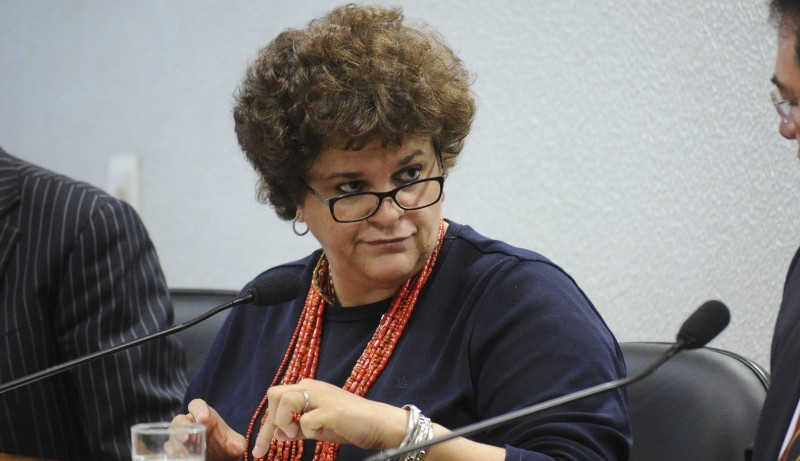
Izabella Teixeira served as Brazil’s environment minister under ousted president Dilma Rousseff (Pic: Senado Federal/Flickr)
Laurence Tubiana, CEO of the European Climate Foundation and architect of the Paris Agreement
The French diplomat said: “The US election result is a setback for global climate action, but the Paris Agreement has proven resilient and is stronger than any single country’s policies.”
She added: “The context today is very different to [when Donald Trump was first elected in] 2016. There is powerful economic momentum behind the global transition, which the US has led and gained from, but now risks forfeiting.”
Bill Hare, climate scientist and CEO of Climate Analytics
Hare, who has contributed to the flagship scientific reports of the Intergovernmental Panel on Climate Change (IPCC), warned that “the election of a climate denier to the US Presidency is extremely dangerous for the world”.
He added: “We are already seeing extreme damages, loss of life around the globe due to human-induced warming 1.3C. President Trump will not be above the laws of physics and nor will the country that he leads. If Trump follows through with his threat to withdraw from the Paris Agreement, the biggest loser will be the United States.”
Yao Zhe, global policy advisor at Greenpeace East Asia
Zhe said: “China finds itself at a pivotal moment. Expectations are high that China will join key nations in reassuring the world that climate action will continue.” She added that, to reassure the world, China should submit a new UN climate plan “that outlines clear actions to transition away from fossil fuels”.
“Climate played a crucial role in stabilising US-China relations during the Biden time. The Trump administration may undo some of the climate diplomacy gains of recent years, but US-China climate cooperation will continue at the subnational level and among non-state actors,” she concluded.
Li Shuo, director of China Climate Hub at the Asia Society Policy Institute
Commenting on who is going to fill the vacuum left by the US if Trump pulls the country out of the UNFCCC, he equated global climate policy to a “tricycle with the three biggest emitters and economies – the US, China and the EU – as its wheels”.
“You need at least two wheels to function at any time,” Li added. “We just missed one wheel now so we need the other two, the EU and China, to carry us forward.”
Mary Robinson, former prime minister of Ireland
Robinson said: “I sincerely hope that the recent hurricanes in the United States have caused President Trump to rethink his belief that climate change will create ‘more oceanfront properties’. It will only bring more death and devastation.”
She called for a redoubling of efforts by those working to tackle global warming, adding: “The outcome of the US elections should not be used as an excuse by world leaders to avoid taking action against climate change.”

Mary Robinson is a climate justice campaigner, UN special envoy and former president of Ireland (Pic: twitter/ODI)
Collin Rees, Oil Change International’s US program manager
Rees called for Biden to “secure his climate legacy” by ending fossil fuel expansion, making permanent a pause on LNG gas exports, shutting down the Dakota Access oil pipeline and fulfilling the US’s commitment to stop financing international fossil fuel projects.
“What Biden does now will determine whether he’ll be remembered as the leader who did his utmost to limit the Trump administration’s damage and keep the world from hurtling towards climate chaos,” he said.
Fatih Birol, executive director of the International Energy Agency
The Turkish energy analyst congratulated Trump in a social media post on X and said that, as during his first term, the International Energy Agency “looks forward to working closely with your new administration to support US energy policy goals and to advance global efforts towards affordable, secure & sustainable energy.”
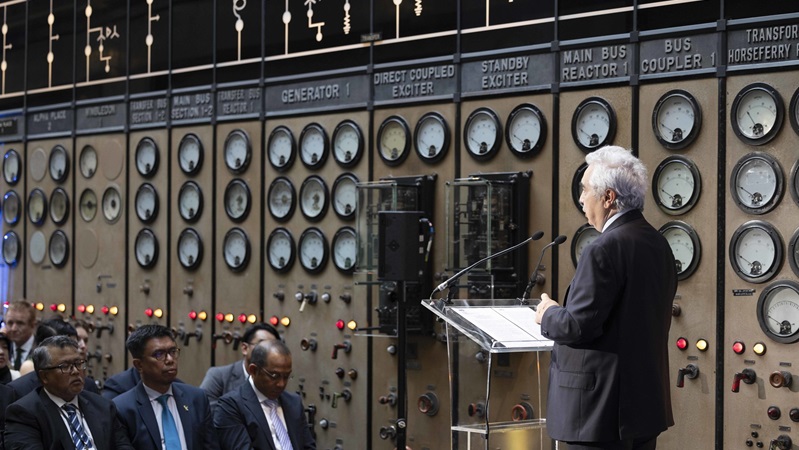
IEA head Fatih Birol speaks at the Battersea power station shopping centre (Picture: Powering Past Coal Alliance)
Avantika Goswami, climate lead at the Centre for Science and Environment
The Delhi-based campaigner said that financing is one of the biggest enablers of decarbonisation. “Not only do we need bilateral aid – which a Trump Presidency is likely to gut – but the US also controls the global financial system largely and uses the hegemony of the dollar to assert its power.”
“Another Trump term”, she said, “no doubts make the much-needed reform of the global financial architecture all the more tricky.” The Biden administration pursued green reform of the World Bank and International Monetary Fund.
She said that other developed countries and emerging economies should “lead the way to ramp up decarbonisation, because we know how high the costs of inaction are”.
Tim McPhie, European Commission spokesperson for climate action and energy
Asked about the election result, McPhie told a press conference that climate action was a matter of “security and opportunity” and job creation for both the EU and US.
Following floods in Spain and hurricanes in the US, McPhie said that “both Europe and America have suffered in recent weeks and months from the devastating impacts of climate change. We need to protect our citizens from climate risks while working to keep them to a minimum.”
Armond Cohen, Clean Air Task Force executive director
The head of the US-based environmental campaign group noted that three-fifths of the nation – measured by sales and power emissions – is covered by laws or utility pledges to achieve zero carbon emissions within the next couple of decades.
“Driven by these commitments,” Cohen added, “wind and solar will likely continue their record pace of deployment, while we are also seeing a revival of interest from governors of both parties in sustaining carbon-free nuclear energy – both existing and new. Texas, a conservative state, is even outpacing California in solar deployment.”
Mohamed Adow, director of Power Shift Africa
The Kenyan campaigner said that the “rest of the world isn’t going to let one country derail global progress in tackling it. The transition away from climate-wrecking dirty energy to clean renewables is more essential than ever.”
He said the Biden administration’s delegation to COP29 needs to push at the summit for a “strong outcome that will ensure the global momentum continues”.
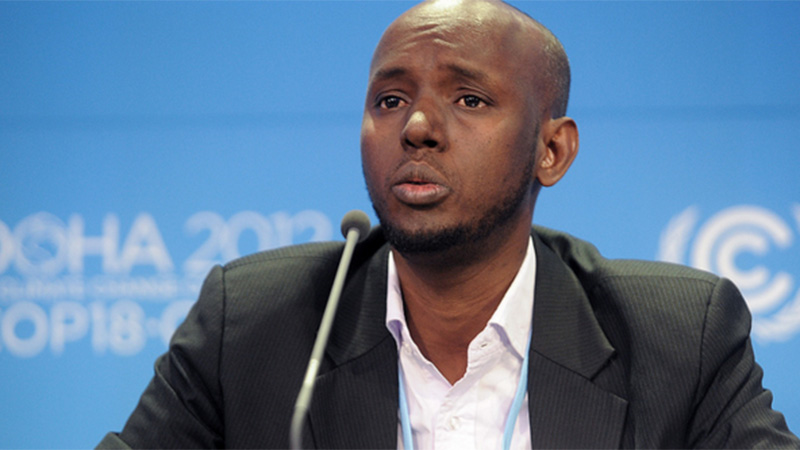
Mohamed Adow (Pic: IISD/ENB/Kiara Worth)
Raila Odinga, former Kenyan prime minister
Odinga, who is a candidate for chair of the African Union Commission, said that US actions on climate “will shape how Africa, a continent that is least responsible for the climate crisis yet suffering most from climate impacts, will navigate its own development path” and “deliver energy access to over 600 million people who are without electricity access today.”
He said COP29 was “a perfect opportunity for the US to step up and be a global steward of the planet” by supporting the delivery of “ambitious grants-based and highly concessional climate finance”.
Arunabha Ghosh, CEO of the Council on Energy, Environment and Water
The Indian think-tank analyst said Trump’s “proposed trade barriers will need careful navigation so that Indian industries, especially for clean technologies, do not suffer”.
He noted that India exports 90% of its solar modules to the US and “will need to be prepared and strategically nimble to deepen green trade, co-develop clean tech supply chains, and accelerate its energy transition”.
“With Donald Trump in power, India can count on continued oil and gas supply to ensure its developmental needs since the US is a net exporter of fuels now. Between 2017 and 2024, the US became the fifth-largest liquefied natural gas (LNG) and crude oil supplier to India,” he noted.
Faten Aggad, executive director, African Future Policies Hub
(Reporting by Climate Home news team; editing by Megan Rowling)
